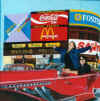
II
Given the cross
Materialism
In the background is the façade of a building covered
over with huge signs and billboards, advertising the most famous brand names
(the façade calls to mind the well-known crossroads of Piccadilly Circus in
London). In the foreground, standing out in the midst of the cars, is a big red
convertible sports-car. A smiling girl with arms outstretched is sitting on the
back of the seat. The entire front of the building is obscured, and nothing of
its original architectural characteristics can be seen: marketing and
consumerism distort everything, wrap everything in an explosion of colors,
proclaiming an artificial and incongruous world. Behind the building there is just emptiness, nothing to the left nor to the right. There is nothing to protract the perspective, only a cloudless sky, as if to emphasize the façade, our consumerism and the emptiness behind it. The young woman, apparently happy and oblivious in the midst of the dazzling lights and colors, spreads her arms out like Christ on the cross, which is the façade of painted-over unreality, the illusion of reflected light, the void in which ideals die, poisoned by materialism. The shop window is a mirror reflecting what usually remains unseen behind us. |
![]()
| A reflection by Brother Bernard Couvillion |
|
The film “Pudding Chômeur” was released in September 1996 in Montreal while I was there. Its publicity poster is a shot from the ceiling of an idle, smiling sixteen-year-old boy in a relaxed pose on a bed. He’s dressed in standard North-American summertime casual wear: leisure shorts, printed T-shirt, Nikes. His ankles are crossed, his hands behind his head on the pillow. What caught my eye was the satin-covered bed. It was in the form of a cross. That
poster stays with me as a metaphor of the cozy secular materialism that
has become the standard for many young people in industrialized
countries. Although
they don’t think of it as a cross, they are addicted to one that leads
to slow death. They have credit-card access to tranquilizers for all
their senses—CD walkman, videos, alcohol, recreational drugs, fast
food and faster cars—capable of satisfying their desires instantly.
But in fact they are deprived: of hardship, of work, of challenge … of
privation. Theirs is a spiritual void. They don’t realize that the
cushions on which they are lounging form a satin-covered cross. Like
the adults who gave them their values, many young people in privileged
material circumstances fear being alone, in silence, face-to-face with
themselves and with God. They take all sorts of diversions, usually
illusory, sometimes with no other reason than, “All my friends are
going.” This name-brand culture is seductive. From the porch of the brothers’ house in Yaounde, a young Cameroon brother pointed up to a residential hillside in a higher part of the city. “In that neighborhood most houses have a satellite dish.” He added regretfully, “The kids are more American than the Americans they watch on their TVs.” |
![]()
| We give voice to the prayer of young people overcome by materialism |
Psalm 73 I am filled with envy of the proud when I see the wicked prosper. For them there are no pains; their bodies are sound and sleek. They have no share in men’s sorrows; they are not stricken like others. So we turn to follow them and drink in all their words. They say: “How can God know? Does the Most High take any notice?” Look at them, untroubled they grow in wealth. |
![]()